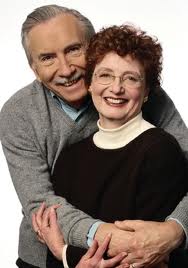 Anxiety caused by stressful events like moving or losing a job is a normal part of life. Anxiety disorders, on the other hand, are characterized by persistent, excessive and disabling fear and worry and get progressively worse if left untreated. It is estimated that anxiety disorders affect between 3 and 14 percent of older adults in a given year. To provide an older audience with additional information, NIHSeniorHealth, the health and wellness website for older adults from the National Institutes of Health (NIH), has added a topic about anxiety disorders (http://nihseniorhealth.gov/anxietydisorders/toc.html).
Anxiety caused by stressful events like moving or losing a job is a normal part of life. Anxiety disorders, on the other hand, are characterized by persistent, excessive and disabling fear and worry and get progressively worse if left untreated. It is estimated that anxiety disorders affect between 3 and 14 percent of older adults in a given year. To provide an older audience with additional information, NIHSeniorHealth, the health and wellness website for older adults from the National Institutes of Health (NIH), has added a topic about anxiety disorders (http://nihseniorhealth.gov/anxietydisorders/toc.html).
Visitors to the website can learn about the risk factors, symptoms and treatments for generalized anxiety disorder, social phobia, panic disorder, post-traumatic stress disorder (PTSD), obsessive compulsive disorder (OCD) and specific phobias such as fear of flying or fear of public speaking. Anxiety disorders can severely affect a person’s life, and they are often overlooked in older adults.
"Conditions that commonly occur with age, such as depression, heart disease and diabetes, may have symptoms that mimic or mask anxiety symptoms, making diagnosis in older adults difficult," says Thomas R. Insel, M.D., director of the National Institute of Mental Health (NIMH). "Often, these health conditions will need to be addressed before a person will respond to treatment for an anxiety disorder."
It can sometimes be difficult to distinguish between common anxiety caused by adapting to difficult life changes — such as fear of falling after a hip replacement—and an actual anxiety disorder. The new topic on NIHSeniorHealth is a good way for older adults to learn more about the way these disorders can affect them.
Information about anxiety disorders is the latest addition to the roster of health topics offered on NIHSeniorHealth (www.nihseniorhealth.gov). A joint effort of the National Institute on Aging (NIA) and the National Library of Medicine (NLM), the website features research-based, easily accessible information on a range of health issues of interest to older people. To improve access for older adults, NIHSeniorHealth includes short, easy-to-read segments of information in a number of formats, including various large-print type sizes, open-captioned videos and an audio version.

Comments